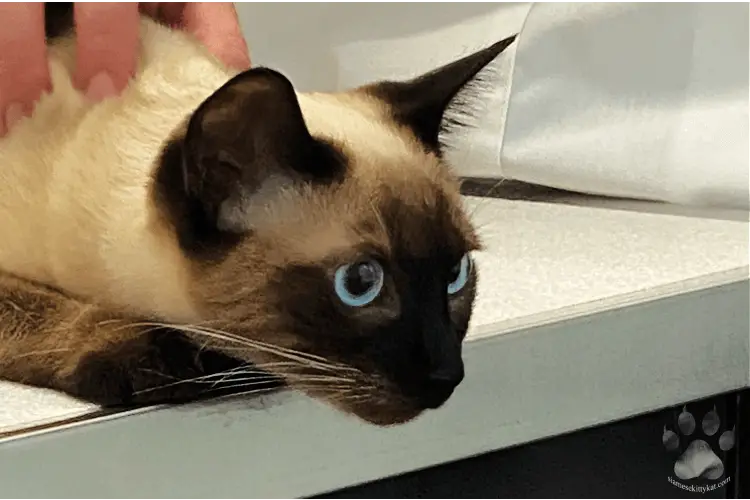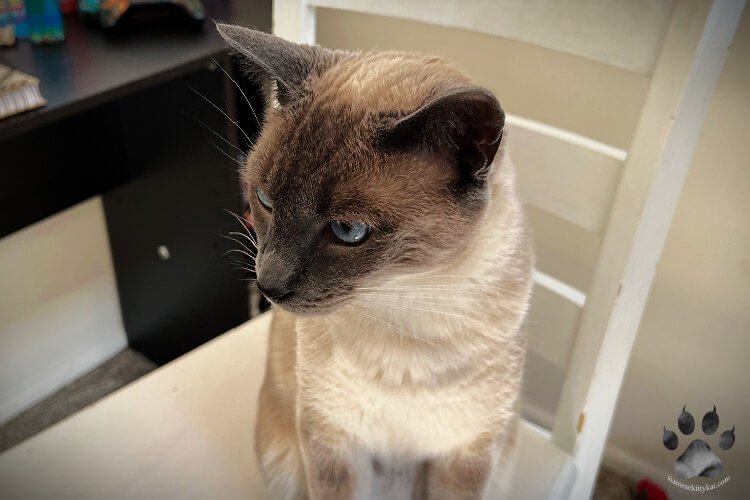Siamese cats are often seen as perfect companions. Their unique beauty and outgoing personalities continue to draw people in. But unfortunately, these cats are also known to be at high risk for developing asthma.
Asthma is a respiratory condition characterized by difficulty breathing, coughing, wheezing, and more. We used to think that it only affects humans, but cats now can get it too.
This article will explore the connection between Siamese cats and asthma. It will examine the causes, symptoms, and treatment options for managing feline asthma.
Which Breeds of Cat are More Prone to Asthma?
The Siamese and Himalayan breeds are two of the most commonly seen cats with asthma.
Research indicates that these health issues tend to occur most commonly in cats between the ages of two and eight.
Weight is another factor that determines whether a cat may be predisposed towards getting asthma. Overweight and obese cats have greater chances of developing a chronic respiratory illness.
How Can I Tell if My Cat Has Asthma?
One of the first things to look out for is changes in your cat’s normal breathing pattern. Cats normally breathe at 25–30 breaths per minute while resting. Any rate higher than 40 breaths per minute could indicate a problem.
Cats with asthma often have labored breathing or panting. They may breathe heavily through their mouths rather than their noses.
Your cat may also make wheezing sounds. Wheezing occurs when airways become constricted or swollen, making it difficult for air to pass through them. This whistling sound can be heard when your cat breathes in and out.
Your cat’s behavior may also change in response to discomfort, such as avoiding physical activity. Some cats will show signs of depression or anxiety. This can manifest itself through excessive grooming. You may want to check whether their fur is thin around their neck or chest area.
Many cats squat with hunched shoulders and necks extended during an asthma attack. This position helps them take deeper breaths and get more air into their lungs.
Some symptoms may point toward asthma, but the only way to confirm whether your cat has this condition is through a comprehensive examination by a qualified veterinarian.
What Causes Asthma in Siamese Cats?

Asthma in Siamese cats is often caused by environmental allergens. Cats with this condition react poorly to dust, pollen, or other particles in the air. These trigger their airways to swell up and become inflamed.
The type of diet a cat consumes can also trigger asthma symptoms. Certain foods, such as fish, corn, soy, and beef, cause adverse reactions. In addition, some cats are sensitive to certain types of litter.
Another potential cause of asthma is stress. Stressful situations such as moving houses or changes in routine can trigger an attack. Cats may also become stressed if they aren’t getting enough exercise or mental stimulation.
Signs that your pet might be stressed include:
It’s also possible for household cleaning products such as bleach and detergents to contribute to asthma attacks. Many cleaning agents contain harsh chemicals, which may trigger coughing and wheezing in sensitive cats.
Indoor air pollution can also cause difficulty breathing. This includes things like air fresheners, incense sticks, and aerosol sprays.
How Do You Test a Cat for Asthma?
There is no single test that can diagnose the condition. Instead, veterinarians rely on a combination of tests to determine whether a cat has feline asthma.
The first step in diagnosing feline asthma is gathering information about the cat’s health history. The vet will consider environmental factors contributing to the cat’s symptoms, such as poor air quality or exposure to cigarette smoke. He os she will also want to know any recent changes in the cat’s behavior or lifestyle.
Vets run imaging studies after obtaining an accurate medical history. These include radiographs, computed tomography, and bronchoscopy scans to get an internal view of the cat’s lungs. The vet will evaluate the condition for signs of pulmonary inflammation or narrowing of the airways.
Blood and allergy testing may be necessary in some cases. This is to further pinpoint the allergen responsible for triggering an asthmatic response.
Can Cats With Asthma Live Long?

The answer is yes! Though there is no cure for feline asthma, it can be managed through timely medical intervention and attentive care of your cat.
Properly administered medications can prevent severe attacks. This allows your fur baby to live a life with minimal symptoms.
How Do You Treat Asthma in Cats?
Medications like corticosteroids and bronchodilators help reduce inflammation in the airways and improve breathing.
You can also prevent your cat’s asthma attacks at home.
- Keep your cat at a healthy weight by providing exercise and good nutrition. Vitamin supplements help strengthen the immune system and reduce inflammation.
- Reduce dust and allergens in the environment. Make sure to keep your cats’ bedding clean. Regularly vacuum carpets and furniture where they spend time.
- Avoid smoking in the same area as your pet. Smoke is a known irritant for cats with asthma.
- Consider installing an air filter in the house if you live near industrial areas.
- Keep the air quality in your home clean by using low-dust kitty litter.
- Minimize the use of aerosol cleaners with strong scents and fragrances.
- Keep your cats indoors, since smoke or dust mites can easily aggravate asthma symptoms.
- Make regular visits to your veterinarian for check-ups and vaccinations.
- Use the medication prescribed by your veterinarian. Make sure you follow the vet’s instructions carefully and give your cat their medication on schedule.
- Give plenty of fresh water to your pet. Staying hydrated helps prevent mucus buildup, which makes breathing easier. Try leaving multiple water bowls around the house.
- Make sure to provide ample warmth for your pet during cold weather. Provide warm blankets when necessary.
- Make sure your cat receives plenty of love and attention.
Feline asthma is a common respiratory issue among Siamese cats. Although there is no cure for this condition, it can be managed with lifestyle changes, environmental modifications, and medical treatments.
It is essential to be aware of the signs and symptoms of asthma in your Siamese cat. Regular vet check-ups are also recommended to ensure your cat receives the best treatment. Following these steps can help keep your Siamese cat healthy and happy for years to come.
We gathered all the health tips tailored toward maintaining your Siamese cat’s optimal well-being. Check it out here: Siamese Cat Health: A Complete Guide
